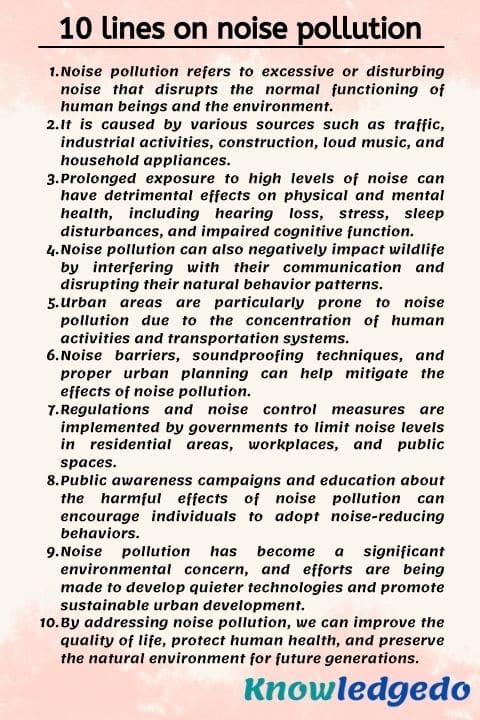Today, we are sharing 10 lines on noise pollution in English. This article can help students who are looking for information about 10 lines on noise pollution. This Lines is very simple and easy to remember. The level of these Lines is moderate so any student can write on this topic.
This article is generally useful for class 1,class 2,class 3,class 4,class 5,class 6,class 7,class 8,class 9,class 10,class 11,class 12
10 lines on noise pollution
1) Noise pollution refers to excessive or disturbing noise that disrupts the normal functioning of human beings and the environment.
2) It is caused by various sources such as traffic, industrial activities, construction, loud music, and household appliances.
3) Prolonged exposure to high levels of noise can have detrimental effects on physical and mental health, including hearing loss, stress, sleep disturbances, and impaired cognitive function.
4) Noise pollution can also negatively impact wildlife by interfering with their communication and disrupting their natural behaviour patterns.
5) Urban areas are particularly prone to noise pollution due to the concentration of human activities and transportation systems.
6) Noise barriers, soundproofing techniques, and proper urban planning can help mitigate the effects of noise pollution.
7) Regulations and noise control measures are implemented by governments to limit noise levels in residential areas, workplaces, and public spaces.
8) Public awareness campaigns and education about the harmful effects of noise pollution can encourage individuals to adopt noise-reducing behaviours.
9) Noise pollution has become a significant environmental concern, and efforts are being made to develop quieter technologies and promote sustainable urban development.
10) By addressing noise pollution, we can improve the quality of life, protect human health, and preserve the natural environment for future generations.

5 lines on noise pollution
1) Noise pollution is the excessive or disturbing sound that can negatively impact human health and the environment.
2) It can be caused by various sources such as traffic, construction, industrial activities, and loud music.
3) Prolonged exposure to high levels of noise can lead to hearing loss, sleep disturbances, stress, and other health issues.
4) Noise pollution can disrupt wildlife habitats, affecting their communication and behaviour.
Implementing noise control measures and promoting awareness can help reduce the harmful effects of noise pollution.
FAQ
Answer: The main sources of noise pollution include traffic noise, industrial activities, construction sites, airports, railways, loud music, and household appliances.
Answer: Prolonged exposure to high levels of noise can lead to various health issues such as hearing loss, stress, sleep disturbances, increased blood pressure, cardiovascular problems, impaired cognitive function, and even mental health disorders.
Answer: Noise pollution can disrupt natural habitats and ecosystems, affecting wildlife by interfering with their communication, mating patterns, feeding behaviours, and migration routes. It can also contribute to the decline of certain species.
Many countries and regions have established regulations and laws to control noise pollution. These may include setting limits on acceptable noise levels for different types of areas (residential, commercial, industrial) and implementing penalties for violations.
Individuals can reduce noise pollution by using quieter appliances, vehicles, and machinery. They can also insulate their homes or workplaces to reduce sound transmission, avoid unnecessary honking or loud music, and support initiatives that promote quieter technologies and sustainable urban planning.
